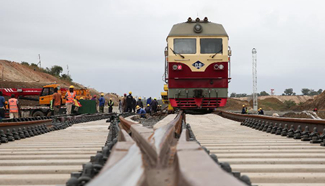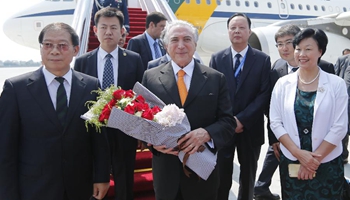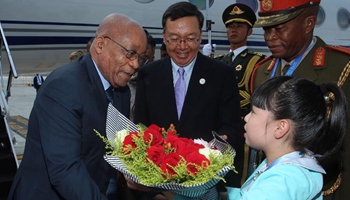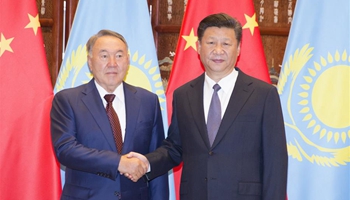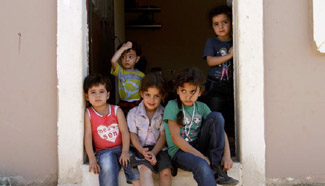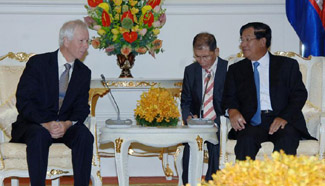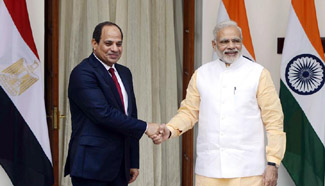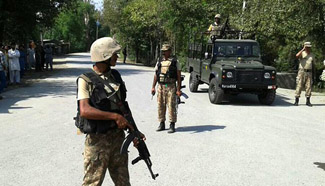SEOUL, Sept. 2 (Xinhua) -- Controversy resurfaced here over the deployment of a U.S. missile shield, or Terminal High Altitude Area Defense (THAAD), in South Korean as ruling party lawmakers boycotted all parliamentary procedures in protest against the National Assembly speaker's remarks on THAAD.
Parliament Speaker Chung Sey-kyun said in his opening speech at the Assembly's first regular session on Thursday that it would be hard to agree with the government's attitude to the THAAD deployment from the perspective of dealing with the Democratic People's Republic of Korea (DPRK)'s nuclear program.
The former lawmaker of the main opposition Minjoo Party accused the government of failing to communicating with the public over the U.S. missile defense system that resulted in split and confusion among people.
Chung urged the government to stop a "chicken game" between the two Koreas, calling for talks with the DPRK that can start with smallest possible issues.
Saenuri Party lawmakers walked out of the chamber, demanding the speaker's apology and resignation. The ruling party has boycotted all parliamentary procedures until Friday, including the passage of a supplementary budget plan for the second half, strongly advocated by President Park Geun-hye to reinvigorate the faltering economy.
Members of the ruling party occupied the speaker's office for a rally against Chung's comments. The governing party lost its majority in parliament in the April 13 elections amid mounting dissatisfactions with income equality and slowing economy.
Chung Jin-suk, the governing party's floor leader, reportedly claimed the speaker violated his duty of political neutrality, but Chung Sey-kyun said his remarks were made to reveal public opinion on a current issue without any political intention.
Park Jie-won, interim chairman and floor leader of the People's Party, said the speaker's remarks were "excellent" as it reflected public concerns about THAAD, depicting what the country's No. 2 said as the greatest opening speech in parliament.
Meanwhile, President Park Geun-hye on Friday made her first mention of a conditional deployment of the U.S. missile shield on South Korean soil, before leaving for Russia to participate in the Eastern Economic Forum.
"The essence of the problem in this matter is the North's nuclear and missile threats. If these threats are eliminated, the need to deploy the THAAD system would naturally disappear," Park said in a written interview with Russia's Rossiya Segodnya posted on a Cheong Wa Dae website.
It marked the first time the South Korean leader mentioned the conditional THAAD deployment, showing signs of a slight change in her hard-line position ahead of her trips to Russia and China that have strongly opposed the U.S. missile defense system.
Park is set to visit Vladivostok for two days to attend the second Eastern Economic Forum and hold a bilateral summit with her Russian counterpart Vladimir Putin. The forum was launched last year to speed up development of the Russian Far East.
She will travle to China to attend a Group of Twenty (G20) summit scheduled to be held in Hangzhou on Sunday and Monday.
Park, however, reiterated that the THAAD deployment is a measure of self-defense to protect from the DPRK's "ever-escalating" nuclear and missile threats.
She said there is no reason, nor practical benefit, for the THAAD system to target any third country, contrasting with repeated expressions of strong objections and worries from China and Russia.
Chinese and Russian objections to THAAD in South Korea came as the U.S. missile shield's X-band radar can peer deep into Chinese and Russian territories, breaking strategic balance in the region and damaging security interests of the two countries.
Related:
THAAD deployment undermines China-U.S., China-ROK strategic mutual trust: spokesman
BEIJING, Aug. 25 (Xinhua) -- The deployment of the Terminal High Altitude Area Defense (THAAD) in the Republic of Korea (ROK) destabilizes the regional strategic balance, and undermines China's strategic interests as well as the strategic mutual trust between China-U.S. and China-ROK.
Wu Qian, spokesperson for the Ministry of National Defense, made these remarks at a regular news briefing. Full story
Anti-THAAD rallies in S. Korea spread on expected site move
SEOUL, Aug. 25 (Xinhua) -- Rallies against the deployment of a U.S. missile shield in South Korea spread as people living in the originally designated site officially called for deliberation on another place to install the shield.
Thousands of residents in the southeastern city of Gimcheon gathered on Wednesday evening to hold a rally against the unilateral deployment decision concerning the Terminal High Altitude Area Defense (THAAD) system, which was made in early July between Seoul and Washington. Full story





